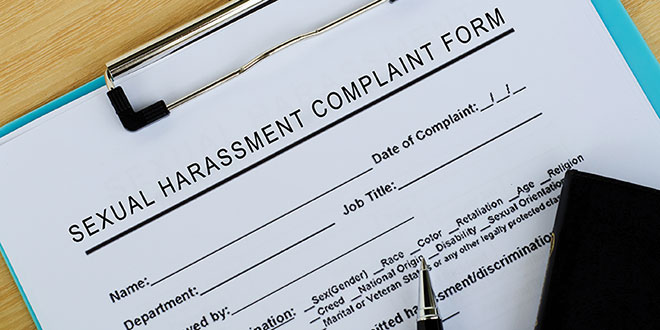Many breaking news headlines over the past year have highlighted a problem that can happen in any business or industry: workplace harassment.
While the Hollywood elite and CEOs of major corporations have been in the spotlight, employees across many industries are reclaiming their power at work as well, shedding light on mistreatment through social media and blogs. With the frequency of these reports in mind, every business must take harassment seriously.
To ensure that you, your business and your employees are all on the same page, it’s important that you not only consider legal compliance but also focus on educating your team members and fostering a safe work environment.
For a better understanding of how retailers can be proactive, Hardware Retailing spoke to Patti Perez, vice president of workplace strategy at Emtrain, a company that strives to create healthier workplace cultures. However, this article is not meant to provide legal advice. If you have concerns about policies and procedures, you should always check with a legal professional.
Hardware Retailing (HR): Can you tell us about your background in this topic?
Patti Perez (PP): Prior to working for Emtrain, I was a licensed California attorney conducting workplace investigations for my clients, who were employers. I am a professionally certified human resources executive, and I’m a specialist in the prevention and resolution of workplace drama, an expert witness in state and federal court and a state regulator. I want to create a shift in the way people communicate and make decisions at work.
HR: Can you define workplace harassment?
PP: I get this question a lot, and I describe harassment in two ways. One is with a capital ‘H’ and the other is with a lowercase ‘h.’ Both make for a toxic work environment, but only the capital H has legal ramifications. However, it’s necessary to prevent and address any type of harassment, even if it’s not illegal.
There are two forms of illegal harassment. One is called quid pro quo, which is a ‘this-for-that’ situation that deals with sex or sexual favors that features a distinct power dynamic from leader to employee.
The other more common form of illegal harassment is a hostile work environment. This doesn’t have to be about sex, but harassment targets one or more protected characteristics, including race, religion, gender, age and disability, among others.
At the baseline, any behavior that someone finds offensive should be addressed. In order to avoid illegal harassment, you need to constantly be training on and tackling the forms of harassment that aren’t technically illegal head-on.
HR: What should an owner or manager understand about harassment?
PP: They need to be aware of what the law says and what it doesn’t say. While a company should be vigilant about appropriate, respectful behavior from every level of the organization, from both a business perspective and legal perspective, more is expected of supervisors. As leaders, they need to be well-behaved and serve as role models and resources for their employees.
All parties should train on and discuss this topic, but leaders in the business have more expectations and legal ramifications. This varies from state to state, so they should consult a lawyer to be aware of the specific laws they need to know.
The goal through all of this, however, is not to scare managers and employees into behaving well, but to educate the team how to be more empathetic and realize how to act. The law is just the floor, not the ceiling. Don’t violate the law. Company culture shouldn’t be to just comply with the bare minimum, but to be respectful all around.
HR: What training should employers implement to address and prevent harassment?
PP: At Emtrain, we encourage all employers to provide education and training for everyone, not just their high-level management.
In the past, training on this topic has only emphasized providing training and awareness to owners or managers of a business. I find that this is because an employer thinks if they educate employees on this topic, they could turn around and sue them. However, I believe educating on harassment will do the opposite. A more informed team of employees knows their rights and responsibilities, and by seeing that the business they work for is committed to preventing and stopping these issues, there is a better chance the employer and management will be made aware of issues right away. This process ensures any inappropriate behavior or actions from others are handled when it’s at a 1 instead of a 9.
While an employment lawsuit is bad, repercussions on the business could be worse. If there isn’t an open forum for employees to voice their concerns, there is a greater chance they will take their problems to social media, blogs or even to the press. To keep it top of mind, however, quick check-ins and follow-up questions and answers can make a big difference.
HR: Why should a retail operation have an open dialogue about workplace harassment?
PP: The emphasis has previously been about training only owners and managers, because the employer is worried an employee will sue them in the case of harassment. However, it’s the opposite. More informed employees who are committed to these issues will address a problem as soon as it happens instead of letting something get out of control.
In my organization, we stress in-house training, whether it’s a live training seminar or an online format. However, training is just a small piece of a large puzzle. As a continuation, I encourage micro-learning sessions to keep all employees on the same page.
I also encourage all employers to look at this conversation as an opportunity to make certain they are complying with the law, and in turn, create a healthier workplace culture. No matter who an employee is, make them feel welcome. This is the best decision you can make. If you have created a productive, engaged workplace, the better off you are as an employer.
I recommend that those employers who provide training in harassment have a meeting with the entire company present. This method assures employees that the high-level people in the company want to know if there are issues and that everyone should be treated with respect.
 Patti Perez
Patti Perez
Vice President of Workplace Strategy
Patti Perez is a certified human resources executive specializing in workplace harassment at Emtrain, a company that creates healthier organizations through online compliance training, expert guidance and data analytics. Learn more at emtrain.com.
 Hardware Retailing The Industry's Source for Insights and Information
Hardware Retailing The Industry's Source for Insights and Information







